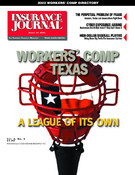State Farm Lloyds, the Dallas-based property insurance unit of State Farm Insurance Companies, received approval from the Texas Department of Insurance (TDI) to sell its nationwide homeowners policy, the HO-W, in Texas, and industry observers wasted no time in welcoming the move.
Public Insurance Counsel Rod Bordelon, who’s often at odds with insurers on pricing and policy issues, lauded the decision to approve the new coverage, stating: “Consumers have recently had little choice but to pay extremely high rates for full coverage in the standard HO-B policy or choose the more restrictive HO-A policy with little or no coverage for water and other damage.”
State Farm Lloyds agreed to reduce rates to reflect differences in coverage between its national HO-W policy and the Texas HO-B policy it previously sold. And the policy gives consumers the option of buying coverage for water damage, foundations and mold at additional cost or turning down those options and paying a lower price for their coverage.
The company’s average rate for a brick veneer house covered for $80,000 will drop from $1,481 for an HO-B policy with mold remediation coverage to $867 for the basic HO-W policy—a reduction of 41.5 percent. The average premium would fall to $1,348, a 9 percent reduction, if a customer selects water and mold coverage similar to that provided in the basic HO-B.
Insurance Commissioner Jose Montemayor, who adopted a renters policy, a condominium unit owners policy and 36 endorsements available to enhance or amend basic policies, in addition to State Farm’s “all-risk” homeowners policy, asserted that approval of the HO-W would lead the way to lower rates statewide.
“Texas consumers and insurance companies now have more homeowners options than at any time in the past 50 years,” Montemayor stated. “I expect the approval of national homeowners policy forms, such as State Farm’s to significantly lower Texans’ homeowners insurance rates and alleviate the availability crisis we’ve seen for the past several months.”
Other insurance companies may also use the “Texanized” version of the State Farm national policy in the state, provided they meet certain criteria: Rates charged for policies must be commensurate with changes in coverage.
The HO-W policy provides limited mold coverage, but an endorsement has been approved that gives consumers the option to buy full mold remediation coverage in amounts of $15,000, $25,000, $50,000 or full policy limits. State Farm also agreed to offer applicants and current policyholders a one-time opportunity to purchase endorsements providing water damage coverage identical to that offered in the HO-B, including coverage for slab foundations. This coverage will be limited, however, to 15 percent of a home’s total insured amount. Those who decline the opportunity will never again be able to buy the coverage again.
State Farm’s new policy form will be implemented beginning with Sept. 1 renewals. Base rates for the new policy will be lower than those of the HO-B policy, but other factors, including homeowners’ location in the state and selections pertaining to mold, foundation and water loss coverages, could affect overall premiums. Because rate increases implemented in November and February have not yet been added to some clients’ policies, their premiums will increase.
“As much as we’d like to think that we need an insurance policy that’s unique to Texas,” stated Ron Dodd, senior vice president of State Farm’s Texas Zone, “the fact of the matter is that the state’s existing policy provides insurance coverage for items that in almost every other state are considered a property owner’s maintenance responsibility. As a result, the costs of those maintenance-type activities have been rolled into the prices that we all pay for homeowners insurance. State Farm’s national policy gives our existing Texas customers the option of keeping these coverages at an appropriate price.”
The Texas Legislature in 1997 granted TDI the authority to approve insurance companies’ own policy forms as an alternative to the state-mandated insurance policies. TDI considered the State Farm policy form—which State Farm uses in 47 other states—at a public hearing in Austin in early February.
Dodd said the company’s national policy will help address the problem of high homeowners premiums in Texas and indicated State Farm continues to seek other solutions. “While this is a positive step,” Dodd stated “we still have obstacles to overcome before we can resume writing new business in Texas.”
In September of last year, State Farm Lloyds, the largest homeowners insurer in Texas, stopped accepting new homeowners customers. The company incurred an underwriting loss of $838.9 million in 2001.
In expressing support for Montemayor’s decision to approve the State Farm policy, Doug Johnson, spokesman for the Insurance Council of Texas, proclaimed, “The commissioner has made a bold move that will be a huge benefit to Texas homeowners… Insurers have contended all along that by introducing a broad range of homeowners’ insurance products to Texas, they could stabilize the market and keep rising costs down… This is a win for insurers and consumers.”
Donald Hanson, southwest regional manager for the National Association of Independent Insurers, also hailed the decision. “This is a very positive development that should provide a measure of stability to the Texas homeowners insurance marketplace,” he said. “By allowing insurers to provide options beyond the previous state mandated policy, consumers will benefit from greater competition among insurers.
Topics Texas Carriers Homeowners State Farm
Was this article valuable?
Here are more articles you may enjoy.


 Charges Dropped Against ‘Poster Boy’ Florida Contractor Accused of Insurance Fraud
Charges Dropped Against ‘Poster Boy’ Florida Contractor Accused of Insurance Fraud  What Analysts Are Saying About the 2026 P/C Insurance Market
What Analysts Are Saying About the 2026 P/C Insurance Market  Winter Storm Fern to Cause Up to $6.7B in Insured Losses
Winter Storm Fern to Cause Up to $6.7B in Insured Losses  Married Insurance Brokers Indicted for Allegedly Running $750K Fraud Scheme
Married Insurance Brokers Indicted for Allegedly Running $750K Fraud Scheme 


